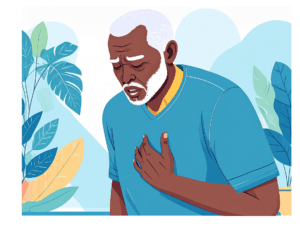Module 2 – Respecting Patient Rights
Ethics Case 2.1
Mr. Day’s Difficulty with Decisions
Mr. Day, a 76-year-old retired architect, arrives at the emergency department with severe chest pain and shortness of breath that has been worsening over the past week. After extensive cardiac testing, including an electrocardiogram and cardiac catheterization, the results reveal significant coronary artery disease with critical blockages that pose an imminent threat to his life. Dr. Sanchez, the attending cardiologist, explains to Mr. Day and his wife that without surgical intervention, he faces a high likelihood of suffering a massive and potentially fatal heart attack within the next few months.
 Dr. Sanchez strongly recommends quickly scheduling a coronary artery bypass graft (CABG) surgery, explaining that it is a major open-heart procedure that would involve taking healthy blood vessels from other parts of Mr. Day’s body to create new pathways around the blocked arteries. And while the surgery carries a 5-8% mortality risk and potential complications including stroke, infection, and prolonged recovery, Dr. Sanchez also emphasizes that it represents the best chance to decrease the risk of Mr. Day suffering a major heart attack and for maintaining a reasonable quality of life.
Dr. Sanchez strongly recommends quickly scheduling a coronary artery bypass graft (CABG) surgery, explaining that it is a major open-heart procedure that would involve taking healthy blood vessels from other parts of Mr. Day’s body to create new pathways around the blocked arteries. And while the surgery carries a 5-8% mortality risk and potential complications including stroke, infection, and prolonged recovery, Dr. Sanchez also emphasizes that it represents the best chance to decrease the risk of Mr. Day suffering a major heart attack and for maintaining a reasonable quality of life.
However, as Dr. Sanchez explains this to Mr. Day, it becomes clear that he is having trouble following along with the conversation. Although Mr. Day appears alert and can engage in basic conversation about his symptoms, he doesn’t seem to understand why he’s being recommended for surgery and insists that he’s “sure it’ll clear up in no time.” He also appears confused about which hospital he’s at, instead calling it by the name of a different hospital he used to go to when he was much younger. Mrs. Day confirms that her husband has been experiencing increasing forgetfulness, confusion, and difficulty with decision-making. She says that she saw the same thing with her mother who ended up developing dementia, and suspects that her husband might be experiencing the early stages of dementia as well. However, because she’s able to help him manage well at home and it wouldn’t change their living situation, she hasn’t bothered to get him formally assessed.
Mrs. Day also tells Dr. Sanchez that while she agrees he should get the procedure done, her husband has always had a deep fear of major surgery, sometimes even stating that he would “rather die naturally than be cut open.” However, she admits that she never really took him that seriously and thought he was just being dramatic. She also isn’t sure how much it matters now, given that surgery appears to be his best and possibly only chance for survival. Dr. Sanchez steps out of the room for a few minutes to consider what she should do next.

